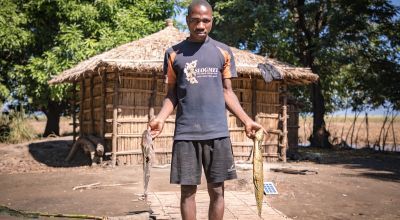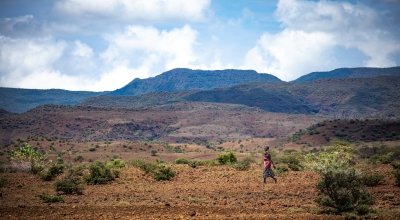
Read our 2024 annual report

Knowledge Hub
You don’t need a Master’s in Environmental Science to understand the current climate crisis, but it helps to have a few definitions in your back pocket.
Here are some of the words we use most frequently in talking about our work, and some of the most common climate change terms that are used everywhere from the New York Times to Twitter. You don’t need to memorise them all, but feel free to bookmark this page as a resource for when you need it.
Climate terms A-C
Adaptation: Adjusting to the current climate and its effects, as well as the expected shifts in climate and those effects. We can't undo the effects of climate change at this point, so Concern's climate change response focuses on adaptation. We do this in order to reduce the risks and harm associated with climate events, especially within families and communities with fewest resources. When possible, we also look for nature-based solutions.
Carbon emissions (aka Carbon footprint): The amount of carbon released into the air, measured by the parts per million within the atmosphere. On its own, carbon is an essential element to all life on earth. However, carbon dioxide (CO2) is a Greenhouse gas (see below), which means that it traps heat in the earth's atmosphere. Some of this is emitted naturally, but much of the current carbon emissions are man-made (from fossil fuels, for example).
Climate: Broadly, climate is the long-term patterns of weather in an area over time, usually 30 years — a date defined by the World Meteorological Organisation. More narrowly, however, we define climate as the average weather qualities over a period of time (which can be 30 years, 30 days, or 30 million years).
Climate change: A shift in the state of weather patterns that can be identified and measured over an extended period — decades or longer. There are many causes of climate change — including some that are natural. But when we talk about climate change, we normally are talking about the changes that are attributed directly and indirectly to human activity that alter the composition of the global atmosphere.
Climate extreme (aka: climate event or extreme weather): A significant departure from the "normal" weather or climate in a given area. Both extreme weather and extreme climate events are referred to as "climate extremes" (see also: Extreme weather, below, for more).
Climate justice: A system of equity that links human rights and development to the issues of climate change, specifically that those who have done least to cause climate change are the ones suffering most from its effects.
Climate projection: We can make an educated guess as to what the climate will be like in the case of future emissions or changes in current habits. This is why the Paris Climate Agreement is important. Climate projections are made based on emissions, concentration, and radiative forces.
Climate Smart Agriculture: Climate Smart Agriculture (CSA) is a set of farming methods designed to increase the resilience and productivity of land affected by climate change.
Climate system: A global system consisting of five major components and how they interact:
- Atmosphere
- Hydrosphere
- Cryosphere
- Lithosphere
- Biosphere
The climate system changes over time due to its own dynamics, as well as due to external forces both natural (e.g., a volcanic eruption) and man-made.

Climate terms D-F
Disaster: Following the United Nations Office for Disaster Risk Reduction's definition, a disaster is a serious disruption in how a community or society functions — at any scale — due to hazardous events interacting with exposure, vulnerability, or capacity. A disaster's impacts will include one or more of the following losses:
- Human loss or impact
- Material loss or impact
- Economic loss or impact
- Environmental loss or impact
Disaster risk reduction (aka: Disaster risk management): Disaster risk reduction (DRR) protects the lives and livelihoods of communities and individuals who are most vulnerable to disasters or emergencies. Whether the crisis is caused by nature or humans (or a combination of both), DRR limits its negative impact on those who stand to lose the most.
Drought: A period of abnormally dry weather that lasts long enough to cause serious water shortages. Drought is relative to an area and season's average rainfall.
Early warning systems: A set of actions used to forecast, predict, and communicate timely, reliable, and relevant warning information to communities. Depending on the context, an EWS may use scientific and/or indigenous knowledge to make as accurate predictions as possible, allowing people to reduce the possibility of harm or loss in the event of a natural disaster.
El Niño (aka: El Niño-Southern Oscillation or ENSO): El Niño was initially used to describe a warm-water current that periodically flows along the coast of Ecuador and Peru, disrupting the local fishery. It has since become identified with warming of the tropical Pacific Ocean east of the date line.
Extreme weather event (aka: Extreme climate event): An event relating to weather or climate patterns that is rare at a particular place and time of year. By definition, these conditions vary from place to place. When a pattern of extreme weather persists for some time, such as a season, it may be classified as an extreme climate event — especially if it yields an average or total that is itself extreme (e.g. high temperature, drought, or total rainfall over a season).
Flood: Overflowing of normal confines of a body of water, or the accumulation of water over areas that are not normally submerged. Types of floods include:
- River floods (aka fluvial floods)
- Flash floods
- Urban floods
- Rain floods (aka pluvial floods)
- Sewer floods
- Coastal floods
- Glacial lake outburst floods (aka GLOFs)
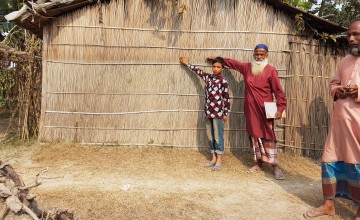
Climate terms G-M
Global warming: An increase in the global mean surface temperature (GMST) averaged over a 30-year period, or within a 30-year period as compared to pre-industrial levels.
Greenhouse gases: Gases that trap heat from the sun passing through the atmosphere. The light passes through, but the gases retain the heat within the atmosphere. There are some natural greenhouse gases (like water vapor and carbon dioxide), but over time humans have added more to the atmosphere, creating a heat trap that has led to the climate crisis.
Heat wave: A period of abnormally hot weather. Heat waves can be considered a climate extreme or extreme weather event.
Hydrological cycle: The cycle in which water:
- Evaporates from the ocean and the land surface
- Is carried over the earth in atmospheric circulation as water vapour
- Condenses to form clouds
- Precipitates over the ocean and land as rain or snow
- Provides runoff on the land surface, infiltrates into soils, and recharges groundwater
- Discharges into streams
- Flows back into the oceans as rivers, polar glaciers and ice sheets, from which it will eventually evaporate again.
Maladaption (aka: Maladaptive actions): Actions that may lead to an increased risk of climate-related impacts, either now or in the future, including increased vulnerability, greenhouse gas emissions, or diminished welfare.
Methane: Another greenhouse gas, usually caused by burning wood, landfill decomposition, and livestock.
Mitigation: A human intervention to reduce greenhouse gas emissions (the flip side of the coin of Adaptation).
Monsoon: Seasonal changes in the direction of a region's strongest winds, especially around the Indian Ocean, blowing from cold to warm regions. These are often associated with rains and flooding as they cause wet seasons, but monsoons can also be associated with dry seasons.
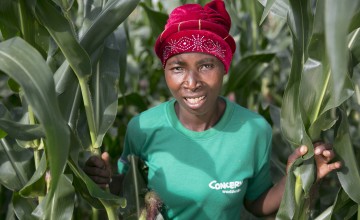
Climate terms P-Z
The Paris Climate Agreement: In 2015, the Paris Climate Agreement was an accord adopted by nearly every nation around the world (signed by 195 countries and the European Union). It marked the first truly global treaty to fight climate change, control greenhouse gas emissions, and curb the global temperature. Its mission: Keep global warming down to under 2°C (3.6°F) above pre-industrial levels, and aim to limit the temperature increase to a maximum of 1.5°C (2.7°F).
Risk: The potential for adverse consequences for communities and ecological systems. Risk can, in terms of climate change, arise from potential impacts of the climate crisis, as well as human response to climate change.
Storm surge: An extreme climate event that results in the increase in the height of the sea level due to extreme weather conditions such as low atmospheric pressure or strong winds.
Storm types (aka: tropical storms, depressions, and hurricanes):
- Tropical storm: A tropical cyclone with maximum sustained winds of 39 to 73 miles per hour. (See Tropical cyclone, below)
- Tropical depression: A tropical cyclone with maximum sustained winds of 38 miles per hour or less.
- Hurricane and typhoon: Both hurricanes and typhoons are a tropical cyclone that has maximum sustained winds of 74 miles per hour (or greater). The only difference between a hurricane and a typhoon is geography: In the North Atlantic, Central North Pacific, and Eastern North Pacific, it's called a hurricane. In the Northwest Pacific, the term used is typhoon.
Tipping point: The critical threshold at which global or regional climate changes from one stable state to another, and does not return to the initial state or norm even if the causes of climate change are reduced or changed.
Tropical cyclone: A strong, cyclonic-scale disturbance that originates over tropical oceans.
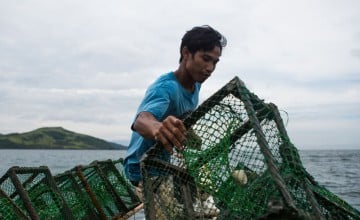
Climate change: Your concern in action
Concern is clear that the climate crisis constitutes the most serious global environmental threat and is a significant poverty multiplier.
The majority of people Concern works with are involved in some way with farming and food production. Many of these communities are also on the frontlines of climate change. We work with rural communities to promote Climate Smart Agriculture, an approach that helps families adapt to better crops, growing techniques, and soil improvement practices in response to the changing — and often unpredictable — environment. We also work to strengthen links with the private sector to facilitate access to supplies and equipment.
We also do a lot of work around disaster risk reduction (DRR), which protects the lives and livelihoods of communities and individuals who are most vulnerable to disasters or emergencies. Whether the crisis is caused by nature or humans (or a combination of both), DRR limits its negative impact on those who stand to lose the most. In some cases, we can reduce the size of a disaster, its strength, or even how frequently it occurs. In tandem with this, we can also make sure that those who are most exposed to these hazards are able to better anticipate, survive, and recover.
Our climate response is unique to the circumstances of each community where we work, but one key theme for us is prioritising indigenous knowledge and nature-based responses. We find solutions that protect, sustainably manage, and restore natural or modified ecosystems to address societal challenges. Nature-based solutions not only help to offset the immediate land degradation caused by climate change, but also address challenges like food security, water security, public health, and social and economic development.



